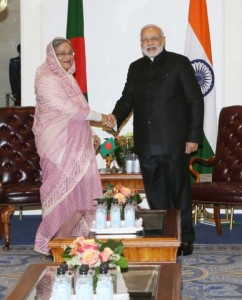 Prime Minister Narendra Modi’s visit to Bangladesh has been a forward-looking step, in the effort to strengthen bilateral relations between the two countries. The progress made with the land boundary agreement and the growing security cooperation between the two countries is well-known, but there has been little focus on the common challenges that the neighbors face. Unless these are addressed, future cooperation between the two will not be effective enough.
Prime Minister Narendra Modi’s visit to Bangladesh has been a forward-looking step, in the effort to strengthen bilateral relations between the two countries. The progress made with the land boundary agreement and the growing security cooperation between the two countries is well-known, but there has been little focus on the common challenges that the neighbors face. Unless these are addressed, future cooperation between the two will not be effective enough.
The first challenge faced by both the countries is the slow pace of economic development that is leading to poverty on both sides. Add to this, the problem of scarce resources. These factors have created a lack of opportunity for peaceful development and progress of individuals and the society at large. This is already taking its toll on the bilateral relationship. Illegal immigration from Bangladesh to India, and the resultant social tension in this country, which has had political implications, is proof of this.
The second challenge is climate change and its impact on the socio-economic life of the people. This is can have ramifications on the bilateral relationship. Climate change issues are directly related to water-sharing, which again is a point of contention between the two countries. India and Bangladesh share 54 rivers and water-sharing will only become more complicated in the future.
Scientists predict that the amount of water in these rivers will reduce over time, due to the depletion of snow and the disappearance of glaciers in the Himalayas, which serves as the source for many of these rivers. Another climate change fallout will be changes in the monsoon pattern. This will again have an impact on the amount of water in the rivers.
A large portion of coastal Bangladesh and India will likely be submerged following a rise in the sea level. This will lead to population migration in India and Bangladesh, which will result in socio-economic tension. India will be challenged to rehabilitate its own population, and the influx of climate refugees from Bangladesh will only complicate the scene. The two sides must be prepared to face this catastrophe.
It is time for the two to work together for shared peace and progress. This demands re-imagining the border areas between India and Bangladesh as one composite economic whole. A few initial steps can be the use of rupee for localised cross-border trading and new visa norms for ease of movement. Besides, there is an urgent need to share knowledge to deal with the challenges of climate change.
Enhancing cooperation between India and Bangladesh is necessary for the peace and stability of South Asia. The role of these two countries is crucial since they have direct access to the Bay of Bengal, where many big powers are looking for dominance due to its geo-strategic location. The India-Bangladesh relationship, however, should not be viewed from the prism of great power rivalry. Such narrowness of vision prevents the growth of the relationship as may lead to misunderstanding. It’s time to have a humanistic vision for the whole of the relationship. There is immense potential for the two countries to grow together and Mr Modi’s visit was just the beginning of a new journey.
Author Profile
- India Writes Network (www.indiawrites.org) is an emerging think tank and a media-publishing company focused on international affairs & the India Story. Centre for Global India Insights is the research arm of India Writes Network. To subscribe to India and the World, write to editor@indiawrites.org. A venture of TGII Media Private Limited, a leading media, publishing and consultancy company, IWN has carved a niche for balanced and exhaustive reporting and analysis of international affairs. Eminent personalities, politicians, diplomats, authors, strategy gurus and news-makers have contributed to India Writes Network, as also “India and the World,” a magazine focused on global affairs.
Latest entries
 DiplomacyJanuary 5, 2026India walks diplomatic tightrope over US operation in Venezuela
DiplomacyJanuary 5, 2026India walks diplomatic tightrope over US operation in Venezuela India and the WorldNovember 26, 2025G20@20: Africa’s Moment – The Once and Future World Order
India and the WorldNovember 26, 2025G20@20: Africa’s Moment – The Once and Future World Order DiplomacyOctober 4, 2025UNGA Resolution 2758 Must Not Be Distorted, One-China Principle Brooks No Challenge
DiplomacyOctober 4, 2025UNGA Resolution 2758 Must Not Be Distorted, One-China Principle Brooks No Challenge India and the WorldJuly 26, 2025MPs, diplomats laud Operation Sindoor, call for national unity to combat Pakistan-sponsored terror
India and the WorldJuly 26, 2025MPs, diplomats laud Operation Sindoor, call for national unity to combat Pakistan-sponsored terror







